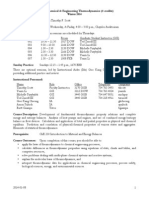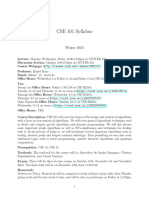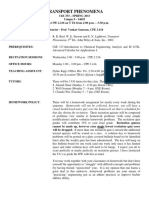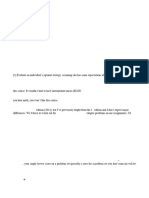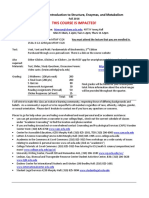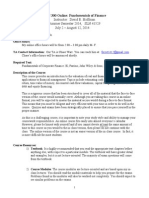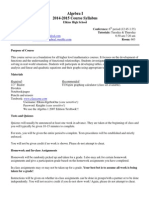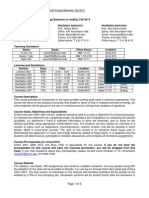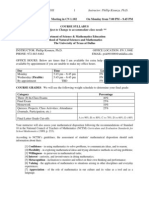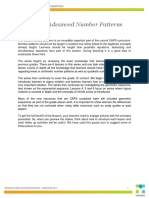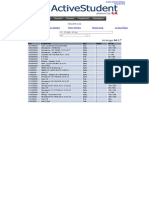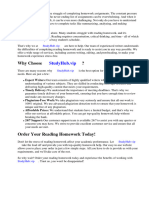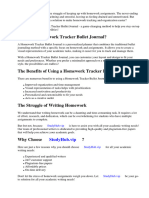Engineering & Chemical Thermodynamics, 2
Uploaded by
flyEngineering & Chemical Thermodynamics, 2
Uploaded by
flyTHERMODYNAMICS
ChE 322 – SPRING 2021
Unique # - 14945
Web-based on T, Thu from 11:00 a.m. – 12:15 p.m.
Recitations: W 2:00 – 4:00 PM
Instructor - Prof. Venkat Ganesan
TEXTBOOK: (Main - Required) Engineering & Chemical Thermodynamics, 2nd ed., Milo D.
Koretsky, Wiley; (Alternate ‐ Optional)J. M. Smith, H. C. Van Ness, and M. M. Abbott, Introduction to Chemical
Engineering Thermodynamics (8th edition), McGraw-Hill (2004).
PREREQUISITES: CHE 210; CHE 317; M 427K; CH 353 (all with C- or above).
RECITATION SESSIONS (MANDATORY, BUT SEE SCHEDULE): Wednesday 2:00 - 4:00 p.m.
OFFICE HOURS: Monday 1:30 – 3:30 pm.
TEACHING ASSISTANT: Tyler J. Duncan (Office Hrs: Monday: 4:30 – 6:00 pm; Tuesday: 2:30-4:00
pm; Thursday: 2:30 – 4pm; Sunday: 2:30-4pm)(tj_duncan@utexas.edu)
TUTORS: Ella Jiang (Tuesday, 4:30 – 6 pm); Dachey Lin (Saturday, 2:30 – 4 pm);
Jacob Sass (Sunday, 11 am – 1pm).
HOMEWORK POLICY: There will be a homework assignment for nearly every week during the
semester. Homeworks will not be collected, however, you will have a closed
book/closed notes quiz over the homework set that is scheduled for that day
during the recitation time. These recitation quizzes will be composed of
problems very similar to homework problems (with some simple
modifications) and/or verbatim homework problems. It may also include
one or two concept questions similar to the ones we will discuss in lectures.
The recitation quiz grades will contribute 30% to your final grade.
Recitation quizzes cannot be made up, however your two lowest
recitation quiz scores will be dropped. If more than two recitation quiz
is missed, the additional missed quizzes will be scored as a zero. A solution
key to homework problems will be posted online after the recitation quiz is
completed.
You may work together with your classmates on homework but don't deny
yourself the opportunity to "struggle" with difficult concepts and problems
(by having friends "spoon-feed" you). It is my opinion that one learns a
great deal in this endeavor....homework problems are your means of
"practicing" engineering just as an athlete practices to improve his/her
athletic ability.
Scholastic dishonesty will not be tolerated and incidents of dishonesty will
be reported to the Dean of Student Affairs.
LECTURE ATTENDANCE: It is important and expected that you will attend all lectures. I will try to do
my part to make the lectures interesting and worth attending. There is a
strong correlation between class attendance and participation in course
activities and understanding and performance in the course, therefore, I
strongly advise you to attend lectures.
If I do see a consistent pattern of absences, I reserve the right to have
unannounced lecture quizzes. These will be short and not require much
preparation beyond the material covered in the previous lecture. Each
of such lecture quizzes (if executed) will carry a weight of 1% towards
the final grade. The weight of recitation quizzes will be reduced by the
appropriate amount to make up for the lecture quizzes.
You will need a scientific calculator which can solve simultaneous
nonlinear equations (TI-Nspire). Since this course will be web-based,
you can use the Excel solver function as an alternative.
EXAMS: Midterm and final exams will be very challenging and you will need to
study extensively to perform well. These exams will be closed book and
closed notes. You will be allowed one "formula card" made up of a 3
in. x 5 in. card with anything that you like written on it (both sides may be
used). Exams cannot be made up.....if a Midterm Exam must be missed
due to illness or family crisis then the Final Exam score will be substituted
for the missed exam. This can only be done once and students that must
miss more than one Midterm Exam should see the Deans Office (ECJ 2.200)
regarding dropping the course. If you have questions about the manner in
which your exam was graded then write a note describing the discrepancy,
attach the note to your exam and return the note and exam to me and I will
review this together with the grader. This procedure must be followed
within one class period of the time the graded exams are initially returned
otherwise we will not re-grade your test. In addition, we will review the
entire exam to look for any other discrepancies (positive or negative).
GRADING: We will strive to fairly grade all of your quizzes and exams. Since you will
have had the problems/templates for the recitation quizzes we expect nearly
perfect work … if it is clear that you have little clue about how to work the
problem you will not receive any partial credit for that problem. The grades
will range from A – F (including + and -).
EVALUATION: Recitation Quizzes
& Lecture Quizzes& 30% - Drop low rec. quiz grade.*
Midterm Exams 16.66% each (3 exams for a total of 50%)#
Final Exam 20%
100% - Possible Final Percentage
*If you must miss a recitation quiz then that will be the quiz grade that you
will drop. Additional missed quizzes will be scored zero.
&Missed lecture quizzes result in a grade of zero for that quiz.
#You may substitute the grade you earn on the Final Exam for the lowest
score you earn on a Midterm Exam (provided all three Midterm Exams are
attempted and your Final Exam grade is higher than at least one of your
Midterm Exam grades).
The University of Texas at Austin provides, upon request, appropriate academic adjustments for qualified students
with disabilities. For more information, contact the Office of the Dean of Students at 471-6259, 471-4241 TDD
or the College of Engineering Director of Students with Disabilities at 471-4382.
COURSE CONTENT:
1. The first law of thermodynamics and its applications (Chapters 1&2)
2. Second law, entropy and applications (Chapter 3)
3. Equations of state (Chapter 4 and 5)
4. Single Component Phase Equilibrium (Chapter 6)
5. Mixtures (Chapter 6)
6. Multicomponent Vapor-liquid; Liquid-liquid equilibrium (Chapters 7 and 8).
7. Chemical reaction equilibrium (Chapter 9).
IMPORTANT DATES:
Feb. 3: Last day to drop a course for a possible refund.
Plan For Recitations
Jan. 20 – Quick intro to steam tables.
Jan. 27 - Recitation Quiz over HW#0.
Feb. 3 - Recitation Quiz over HW#1.
Feb. 10 - Recitation Quiz over Hw#2.
Feb. 17 - Recitation Quiz over Hw#3
Feb. 24 – Recitation Quiz over Hw#4
March 3 – Mid-term Exam 1 (Tentative: Covering only topics till HW #4)
March 10 - Recitation Quiz over Hw#5
March 17 - Spring Break – No quiz.
March 24– Recitation Quiz over Hw#6
March 31 - Recitation Quiz over Hw#7
April 7 – Mid-term Exam 2
April 14 – Recitation quiz over Hw#8
April 21 – Recitation quiz over Hw#9
April 28 – Recitation quiz over Hw#10
May 4 (Monday) – Mid-term exam 3
May **(TBD) - Final Exam for this class as decided by registrar’s schedule.
You might also like
- Transport Phenomena: Mullins@che - Utexas.eduNo ratings yetTransport Phenomena: Mullins@che - Utexas.edu6 pages
- Cognitive Psychology (85-211) : InstructorNo ratings yetCognitive Psychology (85-211) : Instructor7 pages
- Instructors: Math 335 - Chaos, Fractals, and Dynamics Fall 2014No ratings yetInstructors: Math 335 - Chaos, Fractals, and Dynamics Fall 20144 pages
- Course Syllabus: School of Informatics, Computing and Cyber SystemsNo ratings yetCourse Syllabus: School of Informatics, Computing and Cyber Systems8 pages
- Math 611, Spring 2009 Applied Analysis: ReferencesNo ratings yetMath 611, Spring 2009 Applied Analysis: References4 pages
- PHY151H1 Foundation of Physics I 2022FallNo ratings yetPHY151H1 Foundation of Physics I 2022Fall8 pages
- Probability and Mathematical Statistics I: Lectures Instructor Office Extension Email Web-Site TextNo ratings yetProbability and Mathematical Statistics I: Lectures Instructor Office Extension Email Web-Site Text3 pages
- Pate Bio180 Lecture Syllabus - Spring 2016No ratings yetPate Bio180 Lecture Syllabus - Spring 20165 pages
- Spring 2020 PHYS 224 Vibrations and WavesNo ratings yetSpring 2020 PHYS 224 Vibrations and Waves6 pages
- UT Dallas Syllabus For Math3301.501.10s Taught by (pxk091000)No ratings yetUT Dallas Syllabus For Math3301.501.10s Taught by (pxk091000)9 pages
- AM/ECON 11B, Fall 2019. MWF 2:40 - 3:45 PM, Earth&Marine B206 CanvasNo ratings yetAM/ECON 11B, Fall 2019. MWF 2:40 - 3:45 PM, Earth&Marine B206 Canvas6 pages
- Regents Exams and Answers: Chemistry--Physical Setting Revised EditionFrom EverandRegents Exams and Answers: Chemistry--Physical Setting Revised EditionNo ratings yet
- Write the SAT Essay Right! Ten Secrets to Add 100 Points to Your ScoreFrom EverandWrite the SAT Essay Right! Ten Secrets to Add 100 Points to Your ScoreNo ratings yet
- Fundamentals of Bioengineering: Class InstructorNo ratings yetFundamentals of Bioengineering: Class Instructor6 pages
- Computer Simulation of Liquids - Chapter 1No ratings yetComputer Simulation of Liquids - Chapter 147 pages
- "Good Morning Ma'am!" (One Student Will Lead The Prayer) Cyzar John Please Lead The PrayerNo ratings yet"Good Morning Ma'am!" (One Student Will Lead The Prayer) Cyzar John Please Lead The Prayer7 pages
- lesson plan apostrophe of possession 11, 12No ratings yetlesson plan apostrophe of possession 11, 123 pages
- Proiect Didactic - V - L1 - 23.10 - Role ModelNo ratings yetProiect Didactic - V - L1 - 23.10 - Role Model3 pages
- Grade V - Fractions (Revision Practice) - Math - November (Week 2)No ratings yetGrade V - Fractions (Revision Practice) - Math - November (Week 2)3 pages
- Instructors: Math 335 - Chaos, Fractals, and Dynamics Fall 2014Instructors: Math 335 - Chaos, Fractals, and Dynamics Fall 2014
- Course Syllabus: School of Informatics, Computing and Cyber SystemsCourse Syllabus: School of Informatics, Computing and Cyber Systems
- Math 611, Spring 2009 Applied Analysis: ReferencesMath 611, Spring 2009 Applied Analysis: References
- Probability and Mathematical Statistics I: Lectures Instructor Office Extension Email Web-Site TextProbability and Mathematical Statistics I: Lectures Instructor Office Extension Email Web-Site Text
- UT Dallas Syllabus For Math3301.501.10s Taught by (pxk091000)UT Dallas Syllabus For Math3301.501.10s Taught by (pxk091000)
- AM/ECON 11B, Fall 2019. MWF 2:40 - 3:45 PM, Earth&Marine B206 CanvasAM/ECON 11B, Fall 2019. MWF 2:40 - 3:45 PM, Earth&Marine B206 Canvas
- Regents Exams and Answers: Chemistry--Physical Setting Revised EditionFrom EverandRegents Exams and Answers: Chemistry--Physical Setting Revised Edition
- Write the SAT Essay Right! Ten Secrets to Add 100 Points to Your ScoreFrom EverandWrite the SAT Essay Right! Ten Secrets to Add 100 Points to Your Score
- "Good Morning Ma'am!" (One Student Will Lead The Prayer) Cyzar John Please Lead The Prayer"Good Morning Ma'am!" (One Student Will Lead The Prayer) Cyzar John Please Lead The Prayer
- Grade V - Fractions (Revision Practice) - Math - November (Week 2)Grade V - Fractions (Revision Practice) - Math - November (Week 2)



